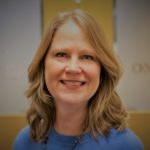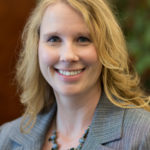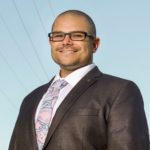CCPI-STEM welcomes the following six individuals to its first cohort of Fellows.
 Bethany Sansing-Helton is lead equity fellow as well as an instructor and co-chair of the Math Department at Madison Area Technical College (Wisconsin). Before joining Madison Area Technical College, she worked as a mechanical engineer at Lockheed Martin in Denver. Bethany has a bachelor’s degree in Physics, a master’s degree in Mechanical Engineering, and a master’s degree in Teaching. She is pursuing a doctor of philosophy degree in Educational Leadership and Policy at the University of Wisconsin-Madison. Her focus is the improvement and success of diverse students in STEM. At Madison Area Technical College she has been involved in Achieving the Dream activities and minority student-focused NSF programs such as the Louis Stokes Alliances for Minority Participation (LSAMP) program. Bethany says, “I want to support classroom action that can be effectively translated across contexts and lead to improvements that are broadly implemented and make a meaningful difference in closing equity gaps in STEM outcomes and employment.”
Bethany Sansing-Helton is lead equity fellow as well as an instructor and co-chair of the Math Department at Madison Area Technical College (Wisconsin). Before joining Madison Area Technical College, she worked as a mechanical engineer at Lockheed Martin in Denver. Bethany has a bachelor’s degree in Physics, a master’s degree in Mechanical Engineering, and a master’s degree in Teaching. She is pursuing a doctor of philosophy degree in Educational Leadership and Policy at the University of Wisconsin-Madison. Her focus is the improvement and success of diverse students in STEM. At Madison Area Technical College she has been involved in Achieving the Dream activities and minority student-focused NSF programs such as the Louis Stokes Alliances for Minority Participation (LSAMP) program. Bethany says, “I want to support classroom action that can be effectively translated across contexts and lead to improvements that are broadly implemented and make a meaningful difference in closing equity gaps in STEM outcomes and employment.”
 Buffy Quinn is assistant dean of Natural and Applied Sciences at Onondaga Community College (New York). She was a geographic information system (GIS) analyst whose specialty was modeling remediation plans for Super Fund sites prior to joining the faculty at Onondaga Community College, a State University of New York college. She has been involved in environmental research activities and was the principal investigator of ATE grant at Onondaga. She continues to collaborate on several ATE projects in the GIS field and currently serves as Onondaga’s grants manager. She is pursuing a doctor of education degree from the University of Southern Mississippi. Buffy says, “My college education gave me both hope and the knowledge I needed for a successful career as a geospatial analyst….This Fellowship will ensure I can continue to play a critical role in changing the lives of students through higher education, just as it changed mine.”
Buffy Quinn is assistant dean of Natural and Applied Sciences at Onondaga Community College (New York). She was a geographic information system (GIS) analyst whose specialty was modeling remediation plans for Super Fund sites prior to joining the faculty at Onondaga Community College, a State University of New York college. She has been involved in environmental research activities and was the principal investigator of ATE grant at Onondaga. She continues to collaborate on several ATE projects in the GIS field and currently serves as Onondaga’s grants manager. She is pursuing a doctor of education degree from the University of Southern Mississippi. Buffy says, “My college education gave me both hope and the knowledge I needed for a successful career as a geospatial analyst….This Fellowship will ensure I can continue to play a critical role in changing the lives of students through higher education, just as it changed mine.”
 DeDe Griffith is vice president for workforce development at Temple College (Texas).DeDe has over 26 years of teaching and workforce development program experience. She is pursuing a doctoral degree in the Community College Leadership Program at Kansas State University, Manhattan. Her doctoral work is based on the hypothesis that “engagement in STEM activities with rural high school students will improve STEM awareness and result in higher enrollment in STEM-related dual enrollment and matriculation to a STEM-related college program.”
DeDe Griffith is vice president for workforce development at Temple College (Texas).DeDe has over 26 years of teaching and workforce development program experience. She is pursuing a doctoral degree in the Community College Leadership Program at Kansas State University, Manhattan. Her doctoral work is based on the hypothesis that “engagement in STEM activities with rural high school students will improve STEM awareness and result in higher enrollment in STEM-related dual enrollment and matriculation to a STEM-related college program.”
 Emily Halvorson-Otts isthe dean of Sciences at Pima Community College (Arizona). She previously taught chemistry, and has master’s degrees in chemistry and teaching. Emily is pursuing a doctor of education degree in Community College Leadership from Ferris State University. She has participated in The Chair Academy and has been engaged in several NSF-funded grant programs.
Emily Halvorson-Otts isthe dean of Sciences at Pima Community College (Arizona). She previously taught chemistry, and has master’s degrees in chemistry and teaching. Emily is pursuing a doctor of education degree in Community College Leadership from Ferris State University. She has participated in The Chair Academy and has been engaged in several NSF-funded grant programs.
 Eugene Mahmoud is a professor of Physics and Engineering at Mount San Antonio College (California). Eugene is a first-year Explorer’s Fellow in the Engineering Education doctoral program at Purdue University. He also currently serves as a principal investigator of a NSF grant project and is active in California’s Engineering Liaison Council. His undergraduate degree was in in Aerospace Engineering and Eugene has two graduate degrees in Mechanical Engineering. His research will focus on how engineering and technology students experience different segments of education systems as they prepare to enter the workforce.
Eugene Mahmoud is a professor of Physics and Engineering at Mount San Antonio College (California). Eugene is a first-year Explorer’s Fellow in the Engineering Education doctoral program at Purdue University. He also currently serves as a principal investigator of a NSF grant project and is active in California’s Engineering Liaison Council. His undergraduate degree was in in Aerospace Engineering and Eugene has two graduate degrees in Mechanical Engineering. His research will focus on how engineering and technology students experience different segments of education systems as they prepare to enter the workforce.
 Michael Silva is a professor of Biotechnology and Biological Sciences at Solano Community College (California), where earned an associate degree. He has bachelor’s and master’s degrees in biology and cell informatics. Michael has extensive work experience in the biotechnology industry. He is pursuing a doctor of education degree in Organizational Change and Leadership at the University of Southern California. His research focuses on student success in biotechnology and manufacturing. Michael says, “Working in the biomanufacturing field allowed me for the first time in my life to not worry about how I was going to afford to put food on the table for my family. I have been dedicated towards ensuring the same opportunities exist for others while ensuring we work together to address ongoing disparities many communities face. It is an honor to be selected as part of our nation’s community college leaders to advance our nation’s ability to improve humanity by developing the STEM workforce as a CCPI-STEM Fellow.”
Michael Silva is a professor of Biotechnology and Biological Sciences at Solano Community College (California), where earned an associate degree. He has bachelor’s and master’s degrees in biology and cell informatics. Michael has extensive work experience in the biotechnology industry. He is pursuing a doctor of education degree in Organizational Change and Leadership at the University of Southern California. His research focuses on student success in biotechnology and manufacturing. Michael says, “Working in the biomanufacturing field allowed me for the first time in my life to not worry about how I was going to afford to put food on the table for my family. I have been dedicated towards ensuring the same opportunities exist for others while ensuring we work together to address ongoing disparities many communities face. It is an honor to be selected as part of our nation’s community college leaders to advance our nation’s ability to improve humanity by developing the STEM workforce as a CCPI-STEM Fellow.”
